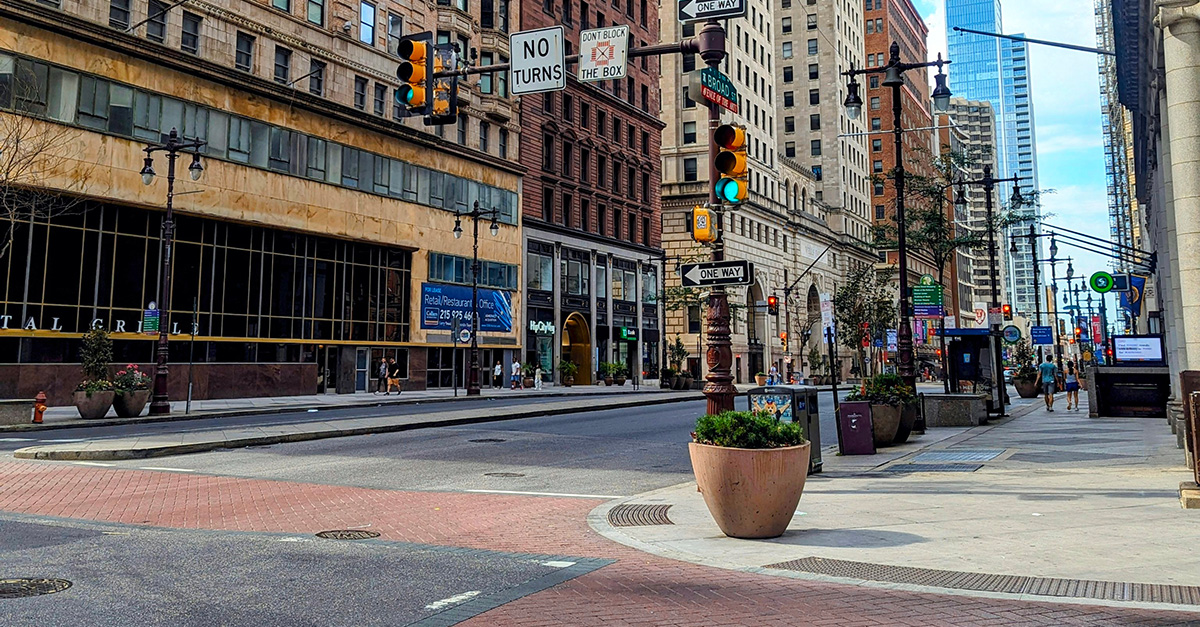On a recent trip to Philadelphia, I had planned to meet with fellow leaders to discuss collaborations and projects. I had meticulously scheduled three meetings, with ample time between them to ensure efficiency, but everything unraveled as the trip neared. One leader canceled because of a family illness, and on the day of our scheduled meetings, the others had last-minute travel changes.
I found myself sitting alone in a beautiful downtown space, frustrated by things beyond my control. Although I was ready for a day of productive work, all my careful planning had crumbled.

Amid my frustration, I felt the Spirit urging me: “Go walk.” I responded, “But I’m exhausted; the last thing I want to do is walk!” The Spirit patiently insisted: “Go walk.”
So I pulled out my sneakers and camera, tied my hair back, and stepped out into the streets of downtown Philly without a specific plan, just a desire to obey.
But as I walked, my frustration deepened. The heat and humidity weighed on me, and I kept questioning, “Why did you send me out walking, Lord?”
It took time to quiet my mind, but eventually, I began to notice my surroundings. Despite finding myself on a street that lacked the picturesque charm of the city center, I began taking photos. Still, as sweat dripped down my face and I tired of the uninspiring views, I was soon ready to leave. Then the Spirit spoke again: “Look up!”
When I shifted my gaze upward, I was amazed by what I saw. The clouds performed, the sunlight was perfect, and the skyscrapers framed the scene beautifully. It was an unexpected treat! Looking up revealed angles and perspectives that transformed my experience, even though I was standing in the same spot that had disappointed me just moments before.

This impromptu photo shoot filled me with a sense of praise for God. Things began to fall into place, and I understood why the Spirit had prompted me to take this walk. After days of rushing and wearing myself thin, my mind, body and spirit started to feel surprisingly rested. There, in the street, I began to reflect on the importance of perspective shifting in our lives and leadership and on our spiritual journey.
I was reminded of 1 Kings 19:11-13, where Elijah did not find the Lord in the strong wind or the earthquake or the fire but in the still, small voice that followed. The Spirit’s prompting had reminded me of the crucial need to be still so that I too could listen to that still, small voice and align my mind and heart with a predisposition to look up and change perspectives. I couldn’t know that this conversation was getting me in touch with a set of leadership tools I soon would need.
The day after the trip, an unexpected and difficult situation required my immediate attention. I recognized that the Lord had been preparing me for this moment during my walk in Philly.
As leaders, especially those wired for strategic thinking, we’re quick to solve problems. But perspective shifting invites us to pause and slow down, both as an act of high-level leadership and as a spiritual practice. Often, the most effective approach emerges not in rushing for solutions but in listening for that still, small voice through scriptural reflection, prayer, and the wise insights of those willing to walk alongside us.
In leadership, as in life, difficulties often serve as gateways to something new. It’s easy to see them as nuisances, and I’ve certainly felt that way at times. But I’ve come to recognize that challenges grab our attention and signal that adjustments are needed. As I faced this tough situation, I knew I needed to shift my perspective, just as I had during my walk. This wasn’t about solving the problem immediately but about stepping back and looking at it from different angles.
Engaging in perspective shifting helped me move beyond binary thinking, enabling a more holistic approach that considered the best resolutions for everyone involved. This mindset opened hidden opportunities, anticipated pitfalls and inspired creative solutions.
Perspective shifting is transformative; it strengthens problem solving, broadens understanding and unlocks new insights. Though it requires effort and discipline, it created the space I needed to ask essential questions: What’s missing? Have I considered all options? What’s at the core of this issue? Reframing my mindset revealed a path to balanced decision making.
In navigating this challenge, I drew on all I knew of leading across diverse ethnocultural, industrial and disciplinary settings. I’ve learned that effective and inclusive communication is crucial but that — even with over 30 years of experience — the challenge of staying contextually and culturally relevant never ceases.
Perspective shifting is essential, prompting me to ask: How can I tailor my approach to resonate within this specific context and culture? Have I set aside biases and assumptions? How might others be perceiving and experiencing these circumstances? Practicing empathy before action fosters collaborative and inclusive environments, deepening connections and leading to more meaningful outcomes.
In Christian leadership, shifting perspectives takes on an even deeper significance, because it can steer toward discernment. It is an invitation to seek God’s wisdom. When adversity tests our faith and humility, do we see it as an opportunity for growth and refinement, as James 1:2-4 reminds us? Are we willing to surrender and listen, allowing the Spirit to guide us, even when Scripture calls for countercultural actions?
Stillness has created space for my heart, mind and spirit to align with God’s voice, helping me navigate difficult situations. Perspective shifting is key; instead of being consumed by challenges, we can be transformed by them. Ultimately, the distinctive mark of Christian leadership is our willingness to look beyond the immediate and trust in the redemptive power of faith to lead us through trials.
As this leadership challenge unfolded, being able to shift perspective gave me the space to discern before acting. Through it all, it was vital to make decisions that would reflect Christian values and integrity. This process sharpened my leadership skills and deepened my spiritual life, allowing me to navigate challenges while experiencing peace that surpasses all understanding (Philippians 4:7).
In each step, the Spirit’s prompt was an essential reminder that true leadership often begins by shifting our gaze upward, trusting that God is with us in every challenge and that transformation lies just beyond the immediate.
...I began to reflect on the importance of perspective shifting in our lives and leadership and on our spiritual journey.





















